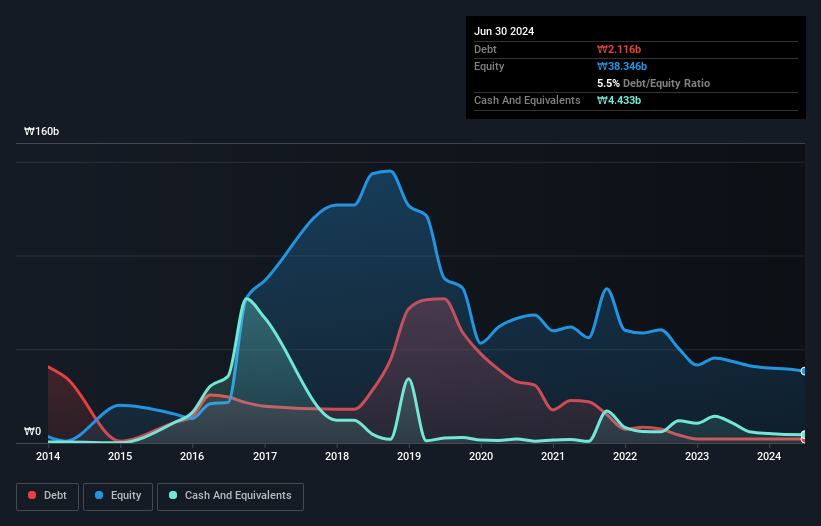Warren Buffett famously said, 'Volatility is far from synonymous with risk.' So it might be obvious that you need to consider debt, when you think about how risky any given stock is, because too much debt can sink a company. We note that Jayjun Cosmetic Co., Ltd. (KRX:025620) does have debt on its balance sheet. But the more important question is: how much risk is that debt creating?
What Risk Does Debt Bring?
Debt is a tool to help businesses grow, but if a business is incapable of paying off its lenders, then it exists at their mercy. If things get really bad, the lenders can take control of the business. However, a more common (but still painful) scenario is that it has to raise new equity capital at a low price, thus permanently diluting shareholders. Having said that, the most common situation is where a company manages its debt reasonably well - and to its own advantage. The first step when considering a company's debt levels is to consider its cash and debt together.
View our latest analysis for Jayjun Cosmetic
How Much Debt Does Jayjun Cosmetic Carry?
The chart below, which you can click on for greater detail, shows that Jayjun Cosmetic had ₩2.12b in debt in June 2024; about the same as the year before. However, its balance sheet shows it holds ₩4.43b in cash, so it actually has ₩2.32b net cash.

How Healthy Is Jayjun Cosmetic's Balance Sheet?
Zooming in on the latest balance sheet data, we can see that Jayjun Cosmetic had liabilities of ₩8.51b due within 12 months and liabilities of ₩121.7m due beyond that. On the other hand, it had cash of ₩4.43b and ₩8.79b worth of receivables due within a year. So it can boast ₩4.59b more liquid assets than total liabilities.
This excess liquidity suggests that Jayjun Cosmetic is taking a careful approach to debt. Given it has easily adequate short term liquidity, we don't think it will have any issues with its lenders. Succinctly put, Jayjun Cosmetic boasts net cash, so it's fair to say it does not have a heavy debt load! There's no doubt that we learn most about debt from the balance sheet. But it is Jayjun Cosmetic's earnings that will influence how the balance sheet holds up in the future. So when considering debt, it's definitely worth looking at the earnings trend. Click here for an interactive snapshot.
Over 12 months, Jayjun Cosmetic reported revenue of ₩21b, which is a gain of 117%, although it did not report any earnings before interest and tax. So its pretty obvious shareholders are hoping for more growth!
So How Risky Is Jayjun Cosmetic?
We have no doubt that loss making companies are, in general, riskier than profitable ones. And we do note that Jayjun Cosmetic had an earnings before interest and tax (EBIT) loss, over the last year. And over the same period it saw negative free cash outflow of ₩7.8b and booked a ₩5.4b accounting loss. With only ₩2.32b on the balance sheet, it would appear that its going to need to raise capital again soon. Importantly, Jayjun Cosmetic's revenue growth is hot to trot. While unprofitable companies can be risky, they can also grow hard and fast in those pre-profit years. The balance sheet is clearly the area to focus on when you are analysing debt. However, not all investment risk resides within the balance sheet - far from it. For example Jayjun Cosmetic has 2 warning signs (and 1 which shouldn't be ignored) we think you should know about.
If, after all that, you're more interested in a fast growing company with a rock-solid balance sheet, then check out our list of net cash growth stocks without delay.
New: Manage All Your Stock Portfolios in One Place
We've created the ultimate portfolio companion for stock investors, and it's free.
• Connect an unlimited number of Portfolios and see your total in one currency
• Be alerted to new Warning Signs or Risks via email or mobile
• Track the Fair Value of your stocks
Have feedback on this article? Concerned about the content? Get in touch with us directly. Alternatively, email editorial-team (at) simplywallst.com.
This article by Simply Wall St is general in nature. We provide commentary based on historical data and analyst forecasts only using an unbiased methodology and our articles are not intended to be financial advice. It does not constitute a recommendation to buy or sell any stock, and does not take account of your objectives, or your financial situation. We aim to bring you long-term focused analysis driven by fundamental data. Note that our analysis may not factor in the latest price-sensitive company announcements or qualitative material. Simply Wall St has no position in any stocks mentioned.
About KOSE:A025620
Jayjun Cosmetic
Manufactures and distributes cosmetic products in South Korea.
Flawless balance sheet with low risk.
Market Insights
Community Narratives




